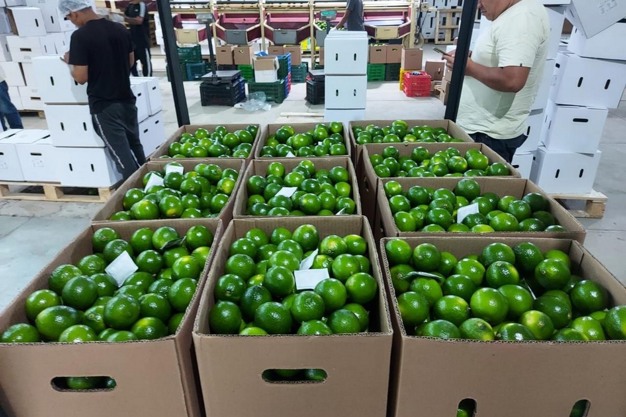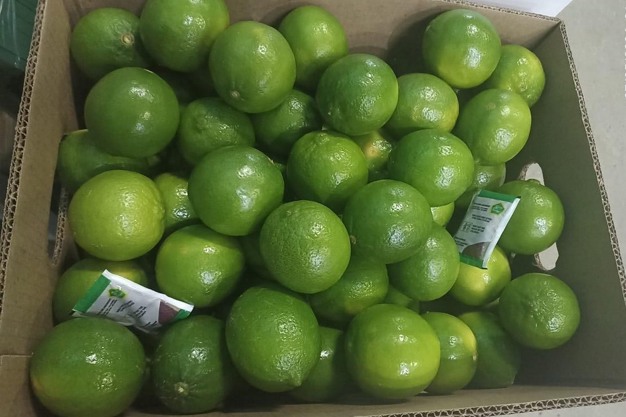There's a booming international market for Tahiti limes, and Peruvian exports of this citrus fruit are achieving remarkable growth. The United States, Chile and Panama have become the main destinations for this product, whose popularity is growing due to its superior quality, outstanding acidity and long shelf life. Despite strong competition from countries such as Mexico, Brazil and Colombia, Peruvian limes are increasingly accepted for their unique characteristics, and they are a preferred option in some niches of the North American market.

Agrocitrus, led by David Maticorena, has established itself as a Peruvian exporter of Tahiti limes, with more than three generations of experience in the fruit's cultivation and export.
Agrocitrus currently exports 60% of its production to the United States. The remaining shipments go mostly to Panama (20%) and Chile (10%). The company expects a 50% increase in exports this year, driven by growing demand in the U.S. market and the possible opening of markets in Europe. It aims to reach 300 hectares devoted to the crop next year, counting both its own and those of associated producers. The company is expanding its production capacity in Piura, an area known for the quality of its limes due to favorable weather conditions that boost the fruit's acidity levels and extend its shelf life.
"In the U.S. spot market, the price of Peruvian Tahiti limes currently ranges between 1 and 1.10 dollars per kilo, while Mexican limes cost around 0.5 to 0.7 dollars per kilo, which makes it difficult to compete in certain seasons. However, in periods when the Mexican production decreases, Peruvian limes become more attractive, reaching average prices of up to 1.40 dollars per kilo. These prices allow Peruvian exporters to remain competitive, especially when the product meets the market's specific quality and size demands."

The water crisis in northern Peru has posed significant challenges for lime producers. Agrocitrus, aware of this situation, has adopted measures such as the implementation of technified irrigation systems, as well as the construction of additional reservoirs to guarantee the water supply throughout the year. "We depend a lot on the rains in the highlands of Piura, in Peru, and in the highlands of Ecuador for the refilling of the Poechos reservoir, which is currently 61% full," says Maticorena, who argues that water management will be crucial in the coming seasons.
One of the main challenges for Tahiti lime growers in Peru is the variability in fruit sizes, largely influenced by water shortages in the north of the country, which has caused plant stress that is taking a toll on the size of the limes. This is especially relevant for the U.S. market, which demands large sizes (between 150 and 200), while other destinations, such as Panama and the Dominican Republic, accept smaller sizes (230 to 250). This variation in sizes has prompted producers to adopt rigorous agronomic management to be able to meet each market's specifications and minimize discards.
Another important challenge is competition with other countries, such as Mexico and Colombia, which also supply the U.S. market with limes; however, Peruvian limes stand out for their acidity and shelf life, which has turned it into a favorite in some segments of the North American market.
To maintain its competitive advantage, Agrocitrus has implemented advanced technology in its harvesting and packing processes. They use artificial intelligence to optimize the fruit's harvesting and ensure that it meets the quality standards required in the United States, while keeping waste below 2%. The company also holds international certifications such as GlobalGAP, SMETA, HACCP and BRC, ensuring high quality and safety standards.
The growth in Tahitian lime exports has had a significant impact on the local economy and the Peruvian agricultural sector. From January to July 2024, the volume of Tahiti lime exports reached 27,000 tons; a 30% growth compared to last year. Agrocitrus estimates that this figure will increase by between 35% and 40% in the next season. "We consider it essential for the quality of the product to be guaranteed and for the growing demand of our international clients to be met," says Maticorena.
For more information: David Maticorena
David Maticorena
Agrocitrus
Tel.: +51 987 210948
[email protected]
www.agrocitrus.com.pe
